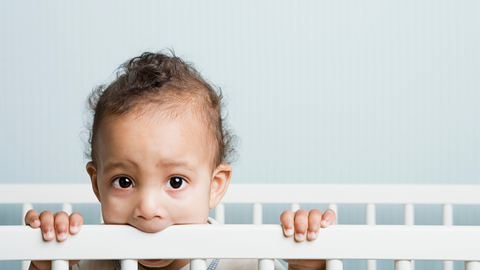Navigating the Autumn Clock-Change with a Baby or Child

So many parents dread the clock changes, especially when they go back. Pre children you got an extra hour in bed… Post children you get woken an hour early!!
Fear not though, our resident baby sleep expert, Hannah Love is on hand to share her wealth of experience and top advice. Over to you Hannah...
Like with travelling and going through different time zones the main thing is to go onto new time as soon as possible and forget about old time. Everything changes- meal times, nap times, bed-times but they all change consecutively so you just change your clocks and aim for the new time!
Your baby may be extra tired leading to nap and bed-times, if they need to go down a little early for the first day or two that’s fine. The quicker you can aim for their usual bed and nap times the sooner they will adjust. You can help start this early by putting your baby to bed a little later on Friday and Saturday night, start the change early. If bed-time is usually 8pm then go to bed at 8.30 on Friday and then change your watch from Saturday morning and aim for a 9pm bed time Saturday.
The main advice is to just go for it!

Whilst on the subject of sleep, one of the most common questions I get asked about sleep, aside from how to deal with clock changes, is early morning waking!
Its not unusual for babies to be bouncing out of their cot at 5am- for me that is still the middle of the night!
There are 2 different scenario’s to early mornings with a baby; if your baby wakes and is still obviously tired, grumpy and would fall back asleep on you, or in bed with you, then they need more sleep. This is common in babies that are still not completely apt at self-settling to sleep, maybe relying on a rock, pat or milk to go off. I also find that it is more common in babies that are not managing long day naps well in their cot just yet.
With a baby that is waking early, and still needing more sleep, then you must address their ability to settle well first. Once this is achieved these good habits can be carried over to the early morning wakes. This ability to self settle can be achieved by removing milk, rocking, patting or anything else they are relying on to go to sleep at bed and nap times (please get in touch for help with this without any need for controlled crying or cry it out or read about self settling here https://www.yummybabygroup.co.uk/the-self-settling-facts-all-parents-need-to-know/
Once they are settling well then tackle the early morning; go in, as if it is the middle of the night, and keep reassuring every now and again until they go back to sleep. The time that they spend awake between waking early morning and going back off should reduce over a period of a couple of weeks, as long as consistency is present. This is also the best way to help them stretch a day sleep; go in, as if it is the beginning of the nap and reassure and re settle until the gap they spend awake reduces. Only do this, if, like mornings, they obviously still need more sleep.
If however your baby is the opposite and is waking ready to start the day; it’s 4.30am and they are smiling, cooing, bouncing out of their cot then you will be fighting a loosing battle trying to get them back off. This is where looking at their routine comes into play.

A baby that is waking ready to start the day too early is either going to bed too early or is having too much day sleep and then compensating by sleeping shorter times at night (or look at it the other way round; sleeping less at night and then compensating with more naps in the day).
Average sleep times
The biggest misconception that I see if form parents of babies who are still napping in the day and are expecting 12 hours of sleep overnight. While a baby is still napping in the day then they will not need a full 12 hours overnight.
A baby of 1 year only needs around 11 hours overnight, a baby of 8 months 10 hours, a baby of 5 months 9 hours and a baby of 2 months 8 hours (this is based on them getting average day sleeps as per the table.)
So if you were putting a baby to bed at 7pm who is 5 months old then you would expect to be getting up at 4am to start the day! Even at 12 months expect your day to start at around 6am and that is if they are on one 2 hour nap in the day, should they be still needing 2 naps, which total more than the 2 hours, then expect an even earlier wake up.
To resolve this; first look at bed times. Take the lower end of the average night-time sleep for your baby and then work out a good bed time (this is personal choice- some parents need to be up at 6 some would prefer later!). Push your babies whole day forward until you reach this time consistently for a minimum of four to five days, you wont see a change in your babies wake up time before that point. (see clock change information below!).
I have come across many parents who feel this doesn’t, work but it does, if you do it consistently for a period of a minimum of 4 days. Unfortunately you wont see a difference in the wake up time before this. However in order for it to be manageable, like with the clock change and jet lag, the whole day needs to be pushed forward in order for it to work. If your baby usually naps at 9 and 12 then with the new change (if adjusting by 1 hour) your baby will nap at 10 and 1. Push the whole day forward and soon you will have the benefits of a longer lie in!

In babies that are in line with overnight sleep times but are waking early, look at their day nap lengths. Look at your babies total nap time, include any dozes around feeds, snoozing around breakfast time etc. Ensure are in line with the lower end of the above average, if not then cut down their day sleep to this. This will mean that they are more tired in the short term but, again over a period of a few days, they should naturally compensate by sleeping longer at night.
Of course there are a small handful of babies that need a lot less (and a lot more) than the average guidelines. As long as your baby is happy, playing well and independently, gaining weight and is not compensating by falling asleep at the dinner table or on you then please don’t worry.
Head over to Hannah's Facebook page for more fabulous advice -click here

